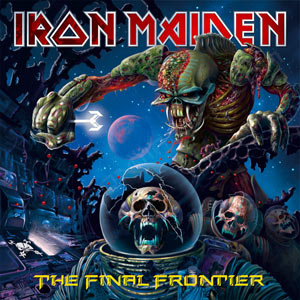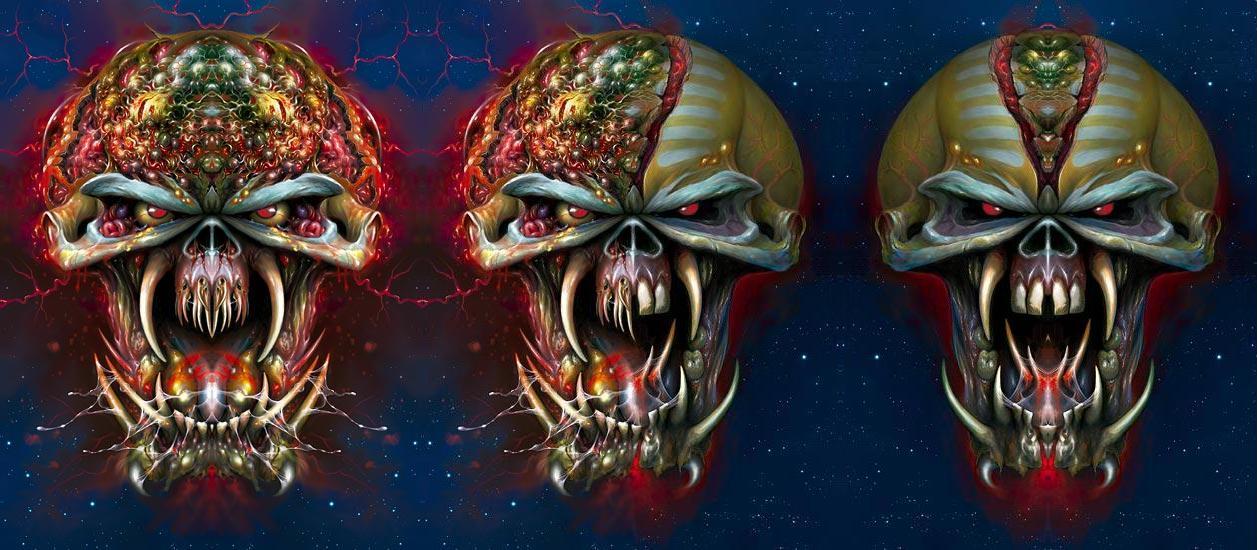
Album Review: Iron Maiden - "The Final Frontier"
Metal fans are a fickle lot, aren't we? We demand material worthy of our fandom, and one day's hero can be the next day's goat. Fortunes change both for better or worse in an instant with one album release, one radio hit, or even something as elementary as a haircut.
We become possessive of our favorite bands, bellowing singers and grandiose shredders. We own the genre. It is a secret bond that all metal fans share; knowing that we are a community the mainstream might well never understand. The very scope of that sentiment grows as the rabbit hole wends deeper into the searing heart of metal's blast furnace.
As our idols age and become the lions in winter, our favor waxes and wanes. We are a youthful, impatient lot; desiring new material that meets our high standard, especially as it relates to a band's previous success.
The most imposing paradox of all that we as fans enforce on those who would carry the banner for metal is that as they age, we want them to expand and grow their repertoire. Yet, concurrently, we want them to produce material that we can recognize, and identify a musician's endemic qualities.
Many bands have failed in the attempt either by not continuing to operate on a high level (often perceived as losing their hunger,) or by straying too far from the sound that we as fans crave. Most if not all of the titans, from Metallica to Judas Priest, even the mighty Slayer, have gone through periods where we wonder how much they have left. (Parenthetically, only Overkill has entirely avoided this phenomenon. I don’t know what their secret is, but it’s clear they’re not sharing.)
So the quandary that my preamble presents to me is Iron Maiden, and their new album “The Final Frontier.” I’m having difficulty deciding which particular lot that it can be identified in. That very quality is assuredly a credit to the band’s songwriting capacity and musical capability, but it doesn’t necessarily mean that every Ed-Hunter is going to pick up what the band puts down. As a reviewer, I would be remiss in my responsibilities if I gave this album a pass for its faults, or concocted fabricated reasons to praise it simply because ‘Iron Maiden’ adorns the cover.

Iron Maiden has long had the potential to make albums like this, but only in the post “Brave New World” era have we seen that truly come to fruition. Similarly to “Matter of Life and Death,” “The Final Frontier” is stacked with epic after epic, with ten tracks totaling up to a whopping seventy-six minutes of music. For those slow to reach for the calculator, let me save you the trouble; the average song is over seven and a half minutes long.
That in and of itself isn’t a detriment, but it does mean that any sense of urgency has been stripped from the album. Those who have followed Iron Maiden’s catalog in recent years probably could have seen this coming, as the band matured and really started to write songs beyond the bounds of their famous history. The eyebrow-raising part for me is that “The Final Frontier,” even more than “Matter of Life and Death,” sees Iron Maiden sounding more akin to one of Bruce Dickinson’s latest solo albums. Now, it’s obvious what the direct correlation there is, but I find it a little astounding that the writing has taken that full leap.
What we as fans have our hands here is an album that we will love or hate solely on our opinion of Iron Maiden’s less accessible songs. If the listener is a lover of densely layered and progressive intricate Iron Maiden, then he or she will be in a paradise of long, winding songs with decadent phrasing and ornate construction. If, conversely, “Aces High” was more your speed, you might well be disappointed.
“El Dorado” is the album’s single, and doubles as its most energetic and, dare I say, ‘classic’ Iron Maiden punk-metal tune. While this is something I don’t get to say altogether too often, the song is an easy six-minute romp that carries the listener along on its trademark Iron Maiden gallop.
To that end, Steve Harris is as inhuman on bass as ever. From the first moment of “Satellite 15…The Final Frontier,” Harris settles right into his idiosyncratic horse-trot, and only leaves there when he wants to play something even more mind-boggling. His talent still clearly places him on a shelf reserved only for him and perhaps Les Claypool on the top of the bass pyramid.
Most of the album features songs much more akin to a slightly slower “The Wicker Man” than “Invaders.” “Coming Home” is a richly crafted song, beautiful in its execution, but also lacks a sense of virility. This same statement could be said about just about anything on the album, from the massively drawn out “The Talisman,” to the long, winding road of “Isle of Avalon.”
Dickinson himself is well represented on “The Final Frontier,” as his vocal presence is one that cannot be replicated. He combines a powerful, precise range with the ability to soften the emotion at will, which helps the album create a very tangible sense of loneliness, isolation, adventure, or whatever it is that Dickinson wants to convey.
Still, “The Final Frontier” is a difficult listen, and not just because of its musical complexity, but because it has a latent tendency to drone on for interminable periods. Similar to all Iron Maiden’s work after 2000, more emphasis is placed on atmosphere than on power, which in my humble opinion makes the album less poignant than “Number of the Beast,” “Powerslave,” or “Piece of Mind.” The songs on this new effort wander with sometimes questionable direction and are possessed of a flair for the dramatic that simply makes you roll your eyes.
There will be many defenders of “The Final Frontier,” and I won’t stop them. I can’t discredit the album for its musical acumen. The talent is remarkable, the layered songwriting fantastic, but the overall sense left me a little dull. Iron Maiden at this juncture is a band of two career phases. If you really enjoy everything since “Brave New World,” you’ll love this. If you’d prefer to be fighting off the cavalry or battling the Luftwaffe, keep listening to your back catalog.

